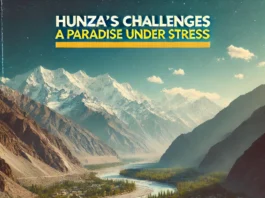The importance of silk routes remained as much as it had during the Great Game. Around the 1840s the great game was started between the Tsarist Empire of Russia and British India. It was a quest for geopolitical locations of Central Asia, including Gilgit Baltistan. In history, the network of silk routes had a great role in Tsarist-British expansionism in high Asia. In the era of British India, the Gilgit agency was created under the direct protection of British forces. The sole purpose was to stop Russian invasion and expansion through the passes in the Pamirs and the Karakorams.
In the same fashion, today the web of these silk routes plays a similar role in china’s political adventure of economic expansionism. For instance, the construction of Karakoram Highway (the new name of the old silk route), which connects South Asia, China, and Central Asia. The recent CPEC and OROB initiative indicates a new pattern of a great game in the 21st century. The formation of organized, systematic, and advanced structure of new high ways suggests that it is a greater game than a great game in the 19th century. The physical infrastructure of these new corridors does not mean mere trade and travel rather it can cause greater changes such as new ideas, cultures, languages, social interactions, and even diseases that can be imagined in the case of the covid-19 pandemic. The forces of Sino expansionism will bring problems as well as opportunities. However, the inhabitants along the silk route, particularly the people of Gilgit Baltistan have to accept the reality that such a sea change cannot be prevented. As the tendency to seek the Chinese language in the youth of Hunza indicates the Sino cultural influence in the region. GB seems likely to be the first piece of the geographical puzzle, which would be affected by future imperial power.
The solutions for such an inevitable revolutionizing wave (the greater Game) approaching down from china are; first is to accept reasonable change which will give positive consequences in future and second is to reject negative change which will because of culture, heritage, and environmental costs. The acceptance of reasonable change also includes doing participation in the economic process like trade and market while demanding equal rights in any kind of developmental project. Gilgit Baltistan is alienated in CPEC, despite its geopolitical importance in connecting the OROB to the rest of the world. Therefore, the dwellers along the Karakoram High way should be given special privileges and incentives in these projects such as free trade zone without tariff barriers, cultural and educational exchanges for the youth, international flights to Gilgit for tourism development, and more important is to open Khunjarab border for international tourism exchange.
Now the most possible alternative for the communities living along the web of silk routes is to set the stage before commencing economic relations on the belt road. It means the preparations for participation in the trade market and the demand for equal access into the market. However, uneven development is part of a modern capitalistic economy and on the other hand, it is a perfect opportunity for thugs of silk to become traders of the silk route.
In these corridors, there will be a flow of commerce, advanced communications, social interactions, ideologies, etc, which would impact and influence the traditions, norms, values even faith of the masses in its way. The matter to ponder for the people of GB is that in past they were at the endpoint in British or western imperialism and today future imperialism is at the doorstep, which can cause much impact.
The article was written by: M Ajmal K Masood



